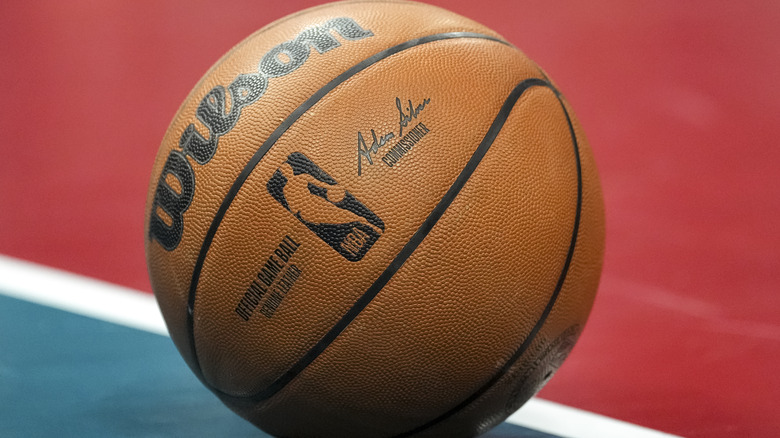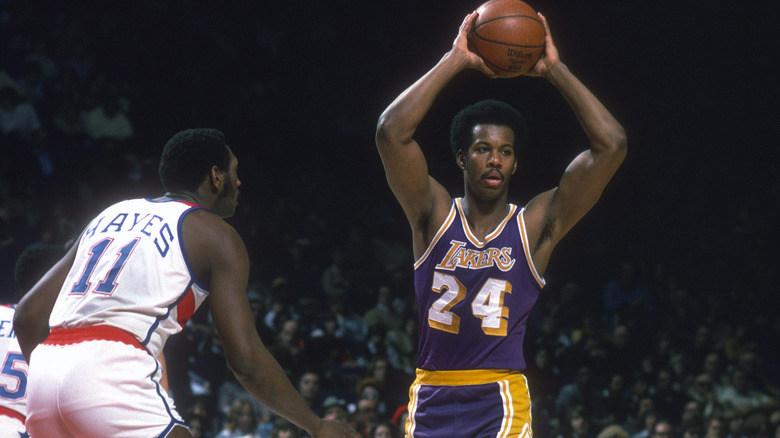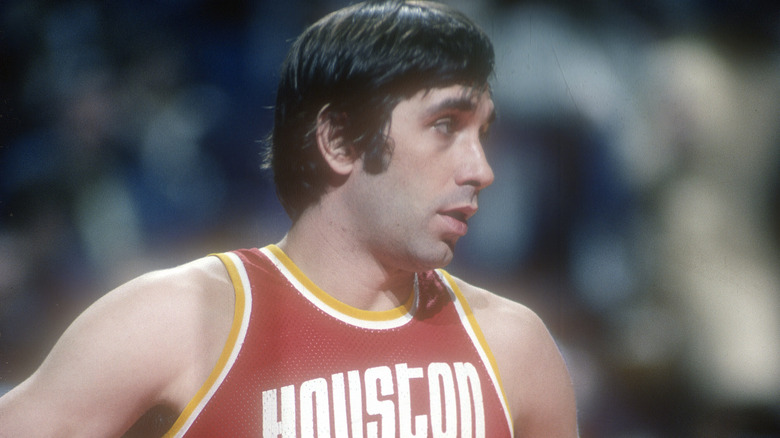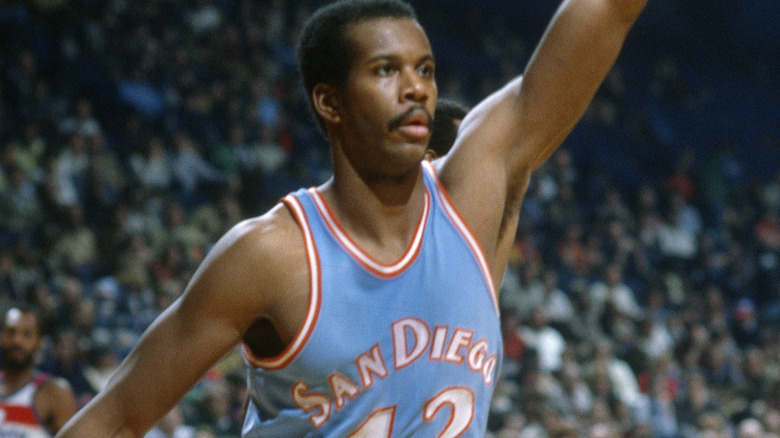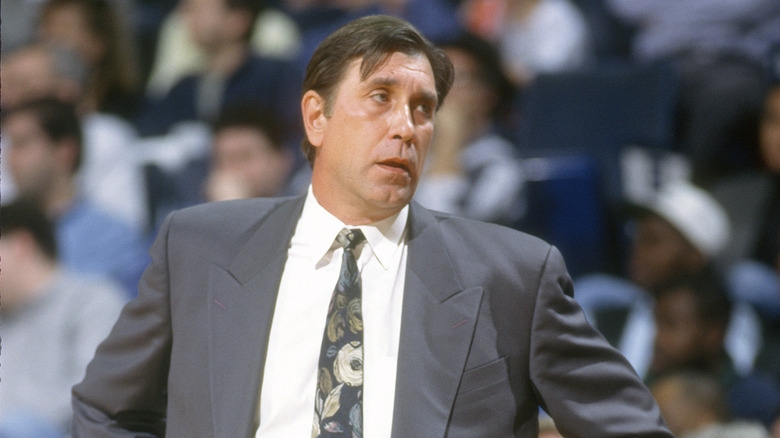The NBA Fight That Nearly Killed A Future Coaching Legend And Changed The Sport Forever
Long before the "Malice in the Palace" earned then-Indiana Pacers star Ron Artest (before those multiple name changes) a season-long suspension as several other teammates and Detroit Pistons players also sat out dozens of games combined, December 9, 1977, was probably the NBA's original "day that will forever live in infamy." That was when bruising power forward Kermit Washington, then playing for the Los Angeles Lakers, sucker-punched high-scoring Houston Rockets star Rudy Tomjanovich, nearly killing the man who would later become an even bigger name as a coach and lead the Rockets to two NBA championships.
It didn't take long for the attack on Tomjanovich to become a part of NBA lore for years to come, as pundits would simply refer to it as "The Punch." Sportswriter John Feinstein, best known for the New York Times best-seller "A Season on the Brink," even wrote a book about it in 2003, going into detail about the events of December 9, 1977, as well as Washington and Tomjanovich's lives before and after the incident. But what triggered the fisticuffs, what happened to the men who were involved in the dust-up, and how did "The Punch" change the sport of professional basketball as we know it?
'The Punch': An incident that truly shook the NBA
The incident that we now know today as "The Punch" took place in the middle of a game between the Los Angeles Lakers and the Houston Rockets. Early in the third quarter, the Lakers' superstar pivotman, Kareem Abdul-Jabbar, missed a hook shot, which was then rebounded by Rockets center Kevin Kunnert, who threw an outlet pass to trigger a fast break attempt. It was at this point where Kermit Washington (pictured above in a game against the Washington Bullets), allegedly grabbed Kunnert's trunks and proceeded to get chippy with the 7-footer. Kunnert elbowed Washington in retaliation, and the Lakers enforcer reacted by throwing a few punches at the opposing big man.
Seeing the escalating commotion, Abdul-Jabbar ran in to break up the fight, grabbing Kunnert in an effort to pull him away from Washington. Rudy Tomjanovich was next to run in, apparently to serve as another one of the proverbial cooler heads. Washington, however, did not see it that way, as he turned his attention to the Rockets forward and punched him squarely in the face, knocking him out cold.
As quoted by the Associated Press, Rockets head coach Tom Nissalke called the incident "the most malicious thing I've ever seen in basketball." He also had a few choice words for Washington, whom he hoped would serve a lengthy suspension for his actions. "Washington has no guts. If he's not out for the year, it's a disgrace," the coach added.
Tomjanovich overcame life-threatening injuries and made a successful comeback
Tom Nissalke may have wanted the NBA to throw the book at Kermit Washington, but all the Los Angeles Lakers forward got from the powers that be was a 60-day suspension and a $10,000 fine. Considering what actually happened to Rudy Tomjanovich, that punishment arguably looked like a slap on the wrist.
Although it seemed at first that Tomjanovich suffered a broken nose from Washington's punch, a subsequent trip to the emergency room would reveal that his injuries were much more severe than how they initially seemed. Aside from the broken nose, he also sustained a number of other facial injuries including a fractured skull and a broken jaw, and there was some spinal fluid leakage as well. All told, Tomjanovich was nearly killed by that punch, and ABC News, writing about the incident 25 years later, compared the impact of the punch to being thrown from a vehicle going 50 miles per hour.
Tomjanovich, who was averaging 21.5 points per game at the time of the incident, missed the rest of the season as he underwent facial surgery. He would come back to play three more seasons for the Rockets before retiring, and even became a five-time All-Star during the 1978-79 season. Most fans, of course, will remember him for his Hall of Fame coaching career, where, among other accomplishments, he won back-to-back championships as Houston's head coach in 1995 and 1996.
Washington also had success after The Punch, but faced legal troubles in recent years
In the aftermath of "The Punch," Kermit Washington seemed remorseful for his actions, telling reporters (via The New York Times), "I saw [Rudy Tomjanovich] coming and I just swung. I had no idea who it was. Now that I've talked to other people, I understand Rudy wasn't going to fight. He's never even been in a fight. It was an honest, unfortunate mistake."
Perhaps unsurprisingly, Washington was on borrowed time with the Los Angeles Lakers following the fight. Just 18 days after The Punch, he was traded to the Lakers' longtime rivals, the Boston Celtics, and would play one season for the San Diego (later Los Angeles) Clippers before spending three seasons with the Portland Trail Blazers. While he retired in 1982 due to back problems, he was productive when he was healthy, consistently averaging around 10 points and 10 rebounds. After five years away from the NBA, Washington made a brief (and forgettable) comeback with the Golden State Warriors in the 1987-88 season, averaging 2.7 points and 3.2 rebounds in six games.
Washington was back in the headlines in 2016 when he was accused of embezzling about $500,000 worth of charitable donations and using the money on vacations, jewelry, and other creature comforts for himself and his girlfriend. According to ESPN, the former NBA star pleaded guilty to aggravated identity theft and falsifying tax returns in November 2017 and received a six-year federal prison sentence for his crimes in July 2018.
The unfortunate legacy of 'The Punch'
As proof of how much "The Punch" impacted the NBA and its fans for years to come, then-NBA commissioner David Stern shared his thoughts on the infamous event, telling the Los Angeles Times in 1985 that it served as a teachable moment, a stark reminder of what could happen when athletes get carried away with their emotions. "You can't discuss violence in any sport without thinking about what happened between Rudy and Kermit," he said. "It crystallized and focused and forever emblazoned on the consciousness of all athletes what can happen."
In that same L.A. Times article, Tomjanovich told the outlet that he already had moved on from The Punch, and done so with little to no issue. "I know that I got through it (the incident) without being angry at the world–or at Kermit," he said. Almost two decades later, he expressed similar sentiments in a 2002 interview with the Houston Chronicle.
As for Washington, he had a much harder time escaping the stigma of The Punch. He told the Houston Chronicle that while he would love to be an NBA coach like Tomjanovich, he was pretty much blackballed from the league because nobody wanted to be associated with the man who punched Rudy T. all those years ago. He did, however, emphasize that the important thing for him is that he and Tomjanovich had long since buried the hatchet. "If Rudy and I don't dislike each other, if he has no animosity, why should people who are not a part of it think that way? ... If he can forgive, anybody can forgive," Washington said.
